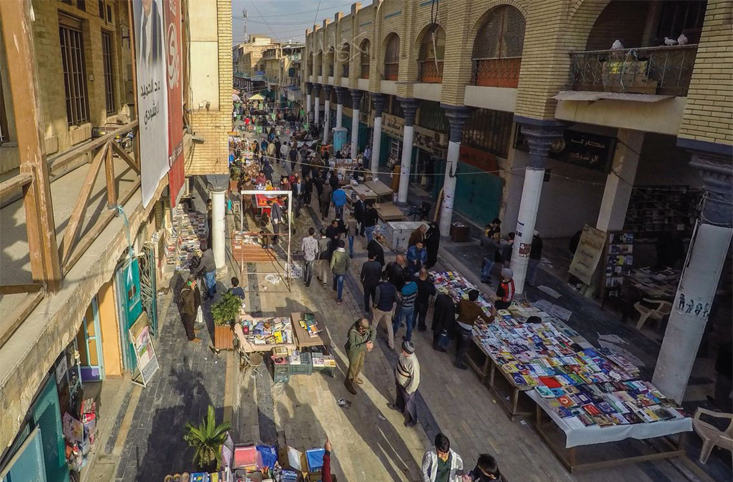Saman was surprised that several thousand Ezidis live in Bgahdad since hundreds of years yet they have no temple to celebrate their rituals.
Saman Khidir, 34, is from Shingal district of Ninveh Northern Province, home to the ethno-religious Ezidi minority. He went to Baghdad to following the brutality of so-called Islamic State ISIS against his community, killing thousands and enslaving thousands of women and children.
"If a religion is recognized, then there should be special landmarks especially temples for religious festivities," Khidir believes.
"If a religion is recognized, then there should be special landmarks especially temples for religious festivities," Khidir believes.
Ezidis used to be around 550,000 before the genocide committed by the extremist group whom accused the Ezidis of being infidels. About 100, 000 fled the country while tens of thousands are still living in displacement camps in the Iraqi Kurdistan region.
Seized by so-called Islamic State ISIS militants in August 2014, Shingal, a majority-Ezidi district on Iraq’s north-western border with Syria, has been the scene of tragedy: a genocidal campaign of killings, rape, abductions and enslavement, and the surviving community fled to safer-heaven IDP camps in the adjacent northern Kurdish region.
Shingal, located 120 west of Mosul, centre of Nineveh province, is home to the Ezidi religious minority and one of the disputed territories between Baghdad and Erbil. Ezidis also live in Shekhan, Bashiqa and other areas in Duhok northern province beside Baghdad and others.

2019: Al-Mutanabbi street, one of the capital Baghdad's landmarks.
Directorate general for affairs of Ezidis has tried to build a cultural center for Ezidis in Baghdad but they couldn't, sayd Khaldoon Salim al-Nissani, an Ezidi researcher resides Bgahdad. Nissani says there are almost 3,000 Ezidis in Baghdad but have no any temple.
There are 80 families, traders, store keepers, businessmen and laborers in Baghdad, making over 3,000 yet in the past it was far more."
Others believe that the Ezidi entho-religious community is centered in Duhok-Mosul region where they can celebrate in Lalish, the holiest temple of Ezidis located in Shekhan district, 60 km northwest of Nineveh, and about 40 km from Dohuk. Shekhan had the second largest Ezidi population prior to ISIS persecution.
Lalish is home for tomb of Sheikh Ibn Musafir, a key figure in the Ezidi faith. Ezidis at least once in their life make a six-day pilgrimage to Lalish and other sacred places.
Ezidi religious spiritual council is also based in Shekhan.
Iraqi MP Khalid Khalil, a member of the Ezidi community, told KirkukNow that Lalish is the center for Ezidi pilgrimage and festivities for Ezidis all over Iraq
Sheikhan 2016: Lalish is the holiest temple for Ezidi adherents. Photo by Binar Sardar.
"Despite all local and international solidarity and sympathy with their cause, the Ezidi is still marginalized," said activist Ayoub Hassan.
Hassan thinks that Iraqi democracy and freedoms is immature as the former regime of Saddam which isolated Iraq from the international community and planted disunity among its components.
"Other components have to defend the Ezidi component and support it be at least giving it the freedom to practice its rituals in Baghdad," he added.
"Other components have to defend the Ezidi component and support it be at least giving it the freedom to practice its rituals in Baghdad," he added.
Iraqi constitution guarantees religious rights for Christians, Ezidis, Sabean Mandaeans of free belief and religious rituals and the state to preserve freedom of worship and its places.
Khidir wondered how the Ezidis are represented in religious Endowment (Awqaf) and there is a special department for the Ezidis but there is no temple or even a cultural center.





